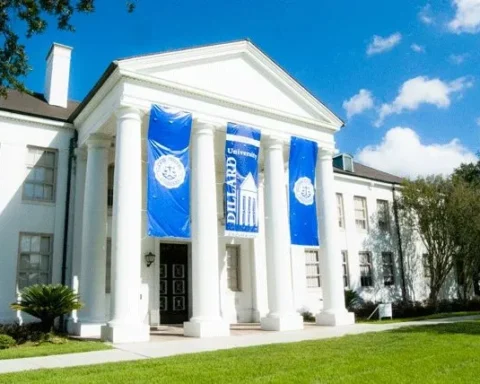By Dee Boling
The Tulane University School of Public Health and Tropical Medicine and Dillard University of New Orleans have signed a memorandum of understanding supporting an academic collaboration that will give Dillard students access to the Tulane school’s Public Health Early Access Program.
“Tulane is happy to be partnering with a historically Black university right here in our backyard,” said Dr. Thomas LaVeist, dean of the Tulane School of Public Health and Tropical Medicine. “We believe partnerships such as this one make public health degrees more accessible to qualified students, and it’s especially important to invite more Black public health professionals into the field where health inequities have had such devastating impacts.”
Dillard is Louisiana’s oldest historically Black university and offers 22 bachelor’s degrees and two certificates in business, health and wellness, the humanities, nursing, STEM and social sciences. The agreement provides guaranteed admission to designated programs for Dillard students who have a minimum 3.3 GPA at the time of their baccalaureate graduation. Students apply via a special admissions portal specifically for students in the Public Health Early Access Program. All students admitted to the Tulane program receive a Public Health Early Access scholarship of $25,000, distributed over four semesters.
Prospective Dillard students learn about the offerings at the Tulane School of Public Health through virtual and in-person seminars, panels, webinars, and other events. Qualified Dillard students are eligible to pursue one of four degrees over a variety of concentrations, including the Master of Public Health (MPH), the Master of Science in Public Health (MSPH), the Master of Public Health & Tropical Medicine (MPHTM), and the Master of Health Administration (MHA). Concentrations include nutrition, international health and sustainable development, epidemiology, and health policy, just to name a few.
“As the first baccalaureate level public health program in Louisiana, the School of Population and Health Sciences is committed to improving the public health workforce – and thereby the health of minority populations – by producing knowledgeable, culturally component minority change agents,” said Dr. Rachael Reed, chair of the School of Population and Health Sciences. “We are excited for this agreement which formalizes an existing relationship and will create more pathways for our students to further their public health education and research for the betterment of our community.”
Students enrolled in the program are matched with a current Tulane public health student mentor to provide opportunities for engagement with Tulane faculty, events with Tulane alumni, and other activities.
The Tulane University School of Public Health and Tropical Medicine, located in New Orleans, was the first school of public health in the United States and ranks among the top 10% of schools and programs of public health.





